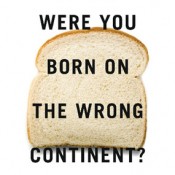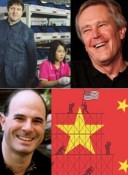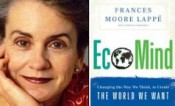Free Forum Q&A – (1) ROKO BELIC director, HAPPY documentary (Originally aired January 2012) (2) RAFE ESQUITH American Teacher of the Year 30+ years, 5th grade, Hobart Elementary, LA author, REAL TALK for REAL TEACHERS (Originally aired September 2007)
Written on May 29th, 2015
Do you want to feel better? Listen to this week’s show. In the first half hour, I talk with Academy-Award-nominated filmmakerROKO BELIC about his documentary,HAPPY, and in the second half with award-winning LA school teacher and author,RAFE ESQUITH about his book,TEACH LIKE YOUR HAIR’S ON FIRE.
Are you happy? How often are you happy? What makes you happy? Does money make you happy? Kids and family? Your work? Do you live in an environment that values and promotes happiness and well-being? Do you expect you’re going to get happier? How?
When the basic approach to the pursuit of happiness that’s been taken by many of us and by society in general isn’t delivering, this is a good time to ask some basic questions. It’s also a good time to do so because we know more than we ever have about what science can tell us about happiness. And we have access to more diverse models and worldviews than ever before.What’s getting lost in your daily shuffle? What toll is stress taking on your body? How could you lead a fuller, happier life?
Q&A: THOMAS GEOGHEGAN, Author
Written on January 28th, 2015 |
Q&A: Rebirth of US Manufacturing – James Fallows, Charles Fishman
Written on January 15th, 2015 |
Aired: 03/31/13
I do my best to question conventional wisdom, but I had heard and repeated the fact that the US had lost its manufacturing and it was never coming back so often that I assumed it must be true. But I pick up the December 2012 issue of the Atlantic magazine recently and two articles jump out at me – both declaring that manufacturing is re-emerging. James Fallows writes of US startups exploiting new technologies to speed up the process of design-to-product, and Charles Fishman writes about US corporations like GE moving production back to the US.
James Fallows’ article, Mr. China Comes to America, opens with these words: “For decades, every trend in manufacturing favored the developing world and worked against the Unites States. But new tools that greatly speed up development from idea to finished product encourage start-up companies to locate here, not in Asia.” That got my attention! Charles Fishman’s article The Insourcing Boom goes even a step further. It’s opening words: “After years of offshore production, General Electric is moving much of its far-flung appliance-manufacturing operations back home. It is not alone.”
I make no bones about the fact that I like to report good news, but I don’t want to make nice or play Pollyanna. This information from these reporters strikes me as the real thing and I’m only too glad to admit I may have prematurely buried “made in America”.
James Fallows www.jamesfallows.com
Charles Fishman www.thebigthirst.com
Q&A: Frances Moore Lappé, Author – ECOMIND: CHANGING THE WAY WE THINK, TO CREATE THE WORLD WE WANT
Written on October 2nd, 2014 |
Aired: 9/8/13
Originally Aired: 12/30/12
Where do you think the most important changes need to take place to turn things around in terms of big issues like the economy, the environment, and social justice?
Some might say climate change is the critical global issue so it must be clean energy. Others might say nothing will make as much difference for the world’s people as educating and empowering girls and women. Closer to home, a case can be made that public financing of political campaigns would have the most impact on all such issues by making it possible for the power of the United States to become a greater force for good.
All good answers, but this week’s guest gives another answer – and its one that I share. Frances Moore Lappe, who has herself been a force for good at least since the publication of the phenomenal best-seller Diet for a Small Planet in 1971, says that the greatest impact would follow from changing our minds.
In her 18th book, ECOMIND: CHANGING THE WAY WE THINK, TO CREATE THE WORLD WE WANT, Lappé argues that much of what is wrong with the world, from eroding soil to eroding democracies, results from ways of thinking that are out of sync with human nature and nature’s rhythms. Humans are doers, she says. But our capacity for doing is undermined by seven “thought traps” that leave us mired in fear, guilt, and despair — none of which are motivators to action.
Drawing on the latest research in climate studies, anthropology, and neuroscience, she weaves her analysis together with stories of real people the world over, who, having shifted some basic thought patterns, now shift the balance of power in our world. Chapter-by-chapter, Lappé takes us from “thought trap” to “thought leap,” and with each shift, challenges become opportunities.
Q&A w/ JEREMY SCAHILL (#5 NYTimes Best-seller) DIRTY WARS: The World is a Battlefield
Written on July 30th, 2014 |
|
Aired: 05/05/13
In JEREMY SCAHILL’S new best-seller, DIRTY WARS, what begins as an investigation into a US night raid gone terribly wrong in a remote corner of Afghanistan quickly transforms into a high-stakes global investigation into the rise of Joint Special Operations Command, the most secret and elite fighting force in U.S. history. In military jargon, JSOC teams “find, fix and finish” their targets, who are selected through a secret process. No target is off limits for the “kill list,” including U.S. citizens.
It’s the unbounded, unending War on Terror: all bets are off, and almost anything goes. We have fundamentally changed the rules of the game and the rules of engagement. Today drone strikes, night raids, and U.S. government-condoned torture occur, generating unprecedented civilian casualties.
DIRTY WARS reveals covert operations unknown to the public and carried out across the globe by men who do not exist on paper and will never appear before Congress, raising questions about freedom and democracy, war and justice, morality and politics. No matter how little you know about these actions, they are being done in your name,
DIRTY WARS is also a documentary which opens in theaters June 7th.

